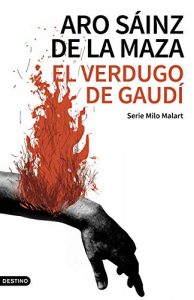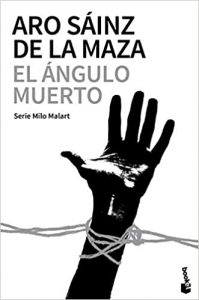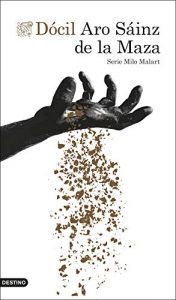When it comes to building portraits for the author on duty, there are always pearls. To document myself in the case of Sainz de la Maza ring I found interesting the one I found somewhere on the Internet: "He began his literary career while allegedly doing his university studies." It caught my attention because it reminded me of myself locked in my room, opposition books to one side as I pounded on the keyboard with the fantasy on duty.
This is how a writer is forged, between renunciations of the real and consequent dedication to the fictitious. Without feelings of guilt or notion of wasted time. It is written because it is written, because the body asks for it. Nothing else.
Of course, in the case of Aro, his career achieved greater resonance than what this blogger ended up achieving here (although as you can see, I continue writing). And so Aro already eats at the same table (or rather the others eat with him because of his seniority) as other more intense black authors such as Michael Santiago, Victor of the Tree, Javier Castillo o Cesar Perez Gellida, among others.
Top 3 recommended novels by Aro Sáinz de la Maza
Gaudí's executioner
When one begins to write a crime novel, the possibility of starting with the victim on duty, which ecce homo of the evil of the human being, always appears as a powerful option.
It has the morbid gaze of a reader who cannot take his eyes off the ominous, with that rather sick curiosity about approaching death or with the intention of already setting clues to the investigative instinct. This is how this novel began, with death enveloped in sinister flames to present an emblematic series protagonist among the blazes: Milo malart. On the facade of La Pedrera a body on fire appears hanging. The subsequent investigation uncovers a degree of extreme cruelty: the victim was hanged alive before being set on fire.
Everything indicates that a psychopath has begun to act in Barcelona for tourists. And politicians, police and judges are in a hurry to stop him. To do this, the Mossos' Special Homicide Group asks Inspector Milo Malart for help, who has been removed from the service due to a disciplinary file. Only he seems capable of stopping the monster that threatens to sow Barcelona with corpses.
The blind spot
Second installment of the series of a Milo Malart that in its verisimilitude, in its contradictions and located in a Barcelona assaulted from within by the crisis, evokes the inspector Méndez himself Gonzalez Ledesma. Only these days everything goes through a greater demand for blood and violence.
The cruelty of the human being has no limits and someone carries out a massacre of dogs in Barcelona and then perpetrates macabre rituals with their bodies in playgrounds, causing outrage in the city. However, things can get worse. When the body of a strangled college student appears in a forest, the case takes on a new dimension. As a cold front hits the city and the rain falls incessantly, Inspector Milo Malart tries to unravel a series of crimes in the streets of a Barcelona devastated by the ravages caused by the crisis, with unemployment and corruption as a backdrop.
Docile
It is true that beyond the principle of magnetism (or perhaps precisely because of it) the opposite attracts the more polarized it is. Love can reach such an intense point that to go a little further is to hate. Everything exists in its opposite, and when it comes to riding contradictions, the murderers, at least, are clear about it... Milo Malart still has a lot to be surprised about in terms of the natural dichotomy of the human being.
On Monday morning, a young man shows up at the police station drenched in blood from head to toe. "They are all dead," he babbles, and then passes out. Analysis of his clothing reveals that the blood belongs to at least three people. Are they facing one more victim, the survivor of a massacre? But then why is he silent when he regains consciousness? There is another possibility: that it is the murderer. However, his environment defines him as a docile boy, incapable of killing a fly. Who is Lucas Torres really?
Milo Malart, a Mossos judicial police officer, faces a particularly cruel and complex case. In a troubled city, immersed in a strange sense of unreality, he is willing to solve it, even if it involves a high personal cost. Docile They go in search of a longing - love, reciprocated love - as the last lifeline so as not to be shipwrecked. Clinging to this illusion as the only hope, they beg for a dream as ephemeral as it is childish, a mirage fueled by the fear of loneliness. And all for a few moments of breath, fleeting, too scarce to fertilize a sense. Especially when it can mean death. Or worse: absolute terror.



